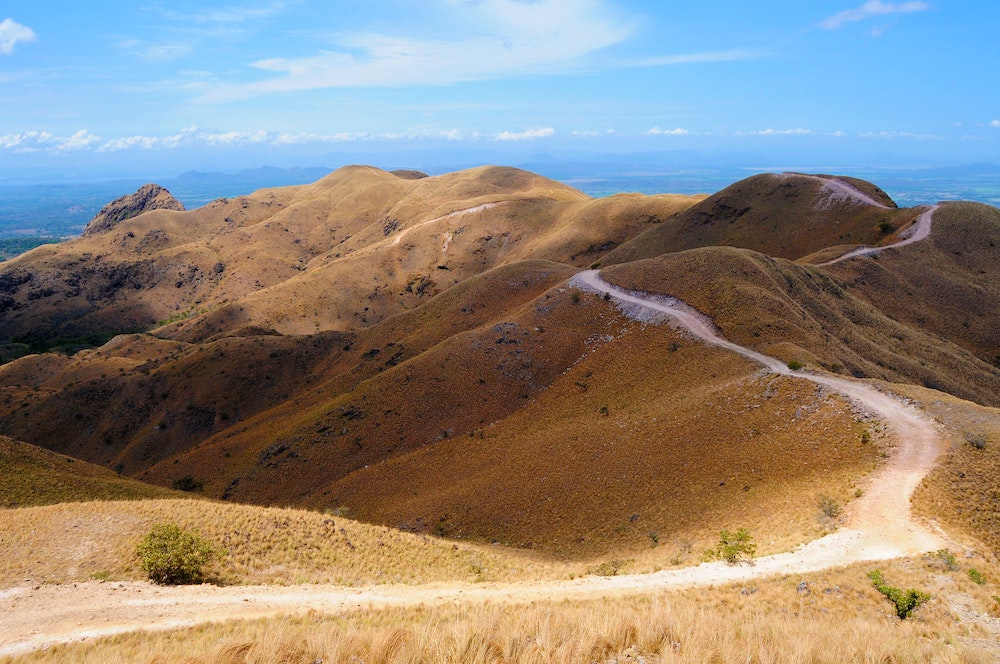
Winding path through desert landscape (Unsplash/Juliana Barquer)
I opened my email inbox the other morning to an unwelcome news briefing alert: 40 Days Until November 3rd. In the midst of a new and unprecedented school year, a sea of now-ebbing worries about loved ones in the West Coast fire zones, and a deluge of distressing headlines each hour, I would love to have the countdown to this election as the last thing on my mind.
But it is the first, always, every day. It's my first thought as I habitually switch on the radio in the morning, the thought I come back to as I eat my lunch and the last thought before I sleep. I read articles — in The Atlantic, most recently — calling it an election like no other, one that threatens democracy itself. And the worst part of all is that as I write these words, they already feel trite, obsolete and obvious. That democracy, decency and civil peace are under siege right now is old, old news.
Perhaps this is why a trite — as in oft-repeated, but not unloved — Bible verse appeals to me so much right now: "Faith is the assurance of things hoped for; the conviction of things not seen" (Hebrews 11:1). If there is one thing that I cannot see at all, or that my mind forces me to wall off, it is all time and space after Nov. 3. I have no predictions, only questions; no plans, only anxious dread. Faith is the only torch — not faith in God's ability to turn us around as a country (that's still and always our mess, our promise, and our duty), but faith that God exists, unchanging and eternally present. I am humbled by the warnings of those who have lived through the collapse of other democracies — not just by their ability to recognize the signals, but by their survival, their hope and their courage. When I think of them — of you, if you have lived through such a collapse — I regain my strength and my urge to act.
Advertisement
Postcards to voters, letters to senators, hours on the ThruTalk campaign platform calling people in swing districts, responding to texts about corruption from voters while working to get out the vote — these are moments of drudgery and fleeting hope that I squeeze into my packed and frenzied schedule. I am not alone. Many friends complain of the piles of blank postcards they have yet to write, worrying as they fill them out about the U.S. Postal Service's capacity to send them, given its state.
Still, the act of writing and talking to potential voters helps me. It provides the conviction of things not seen. From my dining table, I find an assurance of a thing unseen right now in this distanced world — the existence of other voters.
The chapter in Hebrews that this trite verse sits at the top of goes on to outline the faith of Genesis' heroes. Abel offered a righteous sacrifice to an unseen God; Noah had conviction that a worldwide storm would one day end; Abraham wandered through a desert in search of an unknown, though hoped-for, promise; again Abraham entrusted his son's life to an unseen God; Moses fought for freedom with the help of a mysterious God; martyrs died in the hope of the resurrection.
This holy text, this Bible, promises no straightforward safety. It promises instead an inner reward for a life spent on the margins — in tents, in the desert, on a storm-tossed boat, at the hands of political foes. It tells the Gospel of Jesus' short life and his death and resurrection, yes — but it also tells Good News of a different and slower kind — the Gospel of patient, painstakingly persistent faith taken by many people throughout many ages.
Since the beginning of the Christian project, followers have anticipated the eschaton, the end — this tradition has seen 2,000 years of people saying, "the end is near." As an environmental studies major, I am no stranger to thinking about the collapse of life as the world knows it — and many in the world know it far better than I. Every day, there is a reason to think the world could end. Every day, we sit on the brink of some collapse. And every day, some person's world ends.
Still, faith compels us to keep walking and keep working, keep hoping that the world that God called good will continue to flourish — and that you or I can play some small part in keeping that dream alive.
[Rebecca Collins Jordan is an educator in New York City. Originally from Oregon, she is a graduate of Union Theological Seminary and the University of Montana.]
Editor's note: Sign up here and we can send you a note every time a Young Voices column is posted to NCRonline.org so you won't miss any.





